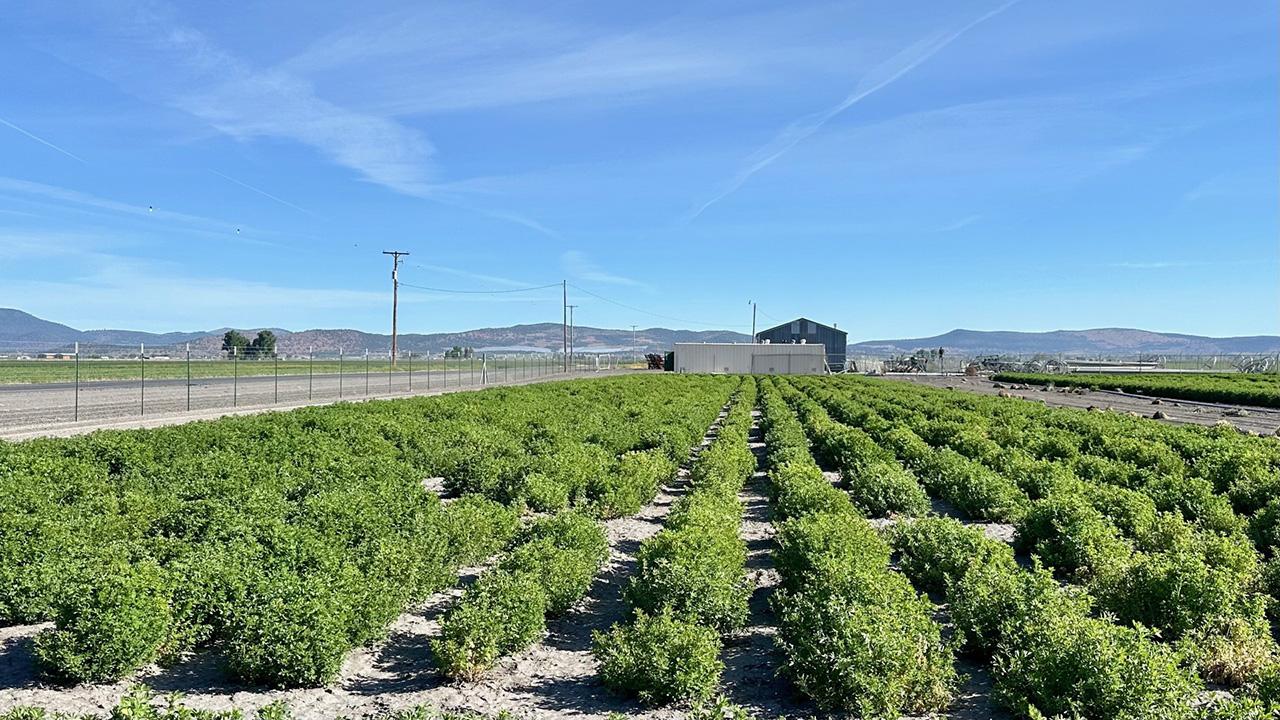Davis, California, USA
September 9, 2024
Scientists are seeking the genetic basis for breeding new varieties of alfalfa that can withstand the pressures of climate change and evolving pests and disease.
 Alfalfa from seed banks around North America grows in a trial at the Intermountain Research and Extension Center in Tulelake, in northeastern California, in late May 2024. The center is operated by the University of California Agricultural and Natural Resources (Charlie Brummer/UC Davis)
Alfalfa from seed banks around North America grows in a trial at the Intermountain Research and Extension Center in Tulelake, in northeastern California, in late May 2024. The center is operated by the University of California Agricultural and Natural Resources (Charlie Brummer/UC Davis)
The United States is the world’s largest producer of alfalfa, growing nearly 50 million tons in 2023, according to the U.S. Department of Agriculture. Even Chinese dairy farmers prefer it for its superior quality, importing more than 1.2 million tons of all American-grown forages in 2023, the USDA reported.
But the stresses of climate change -- including too little or too much water, poor water quality and high temperatures -- have government and industry leaders seeking new varieties.
To meet the needs of cattle and dairy producers, researchers at the UC Davis Department of Plant Sciences are scanning the contents of seed banks in trials across the country for genetic traits that could be used to breed alfalfa of the future. A nation-wide project led by Charlie Brummer, a professor in the department, has received a grant of $936,000 over the next three years from the Alfalfa Seed and Alfalfa Forage Research Program, within the USDA’s National Institute of Food and Agriculture.

Charlie Brummer is a professor in the UC Davis Department of Plant Sciences and director of the UC Davis Plant Breeding Center. This alfalfa field is part of the university's experimental lands just east of campus. (Trina Kleist/UC Davis)
“We’re trying to use the genetic resources preserved in the USDA National Plant Germplasm System to help improve alfalfa,” said Brummer, who also is director of the UC Davis Plant Breeding Center. The project includes collaborators at Cornell University in New York and with the USDA Agricultural Research Service in Washington state and Wisconsin.
Alfalfa seed previously collected from a thousand spots around the world and stored at the NPGS will be evaluated for genetic variations that would help growers adapt to future conditions, while still producing a crop with high yield and nutrition. Scientists will map the plants’ genes and their genetic diversity, grow plants in different locations and conditions across the country, and look for candidates that could be released to plant breeders for further development. They’ll also reach out to private-sector alfalfa breeders to share the treasures they find.
High priority, international roots
The project is the continuation of a program initially funded in 2017 and renewed in 2019 that laid the foundation for the current research by developing initial seed pools of plants that would be suitable for the northern U.S. and southern Canada. The seed pools come from California, Wisconsin, New York, Quebec and Alberta.
Leaders in the alfalfa seed industry wrote in support of the grant.
The project addresses “the high priority need of the alfalfa industry to develop new cultivars that are resilient in the face of variable weather, limited or excessive water, increased pest and disease pressure and costly inputs,” the researchers wrote.
Farmers planted more than 10.6 million acres of alfalfa in 2023, according to the USDA’s National Agricultural Statistics Service. It’s used primarily as forage for beef cattle and dairy cows. A member of the legume family, the plant originated in what is now Turkey and Iran. Seed that will be examined in this project draws from alfalfa with roots across Europe, the Middle East, eastern Asia and Siberia, according to the proposal.
Related links